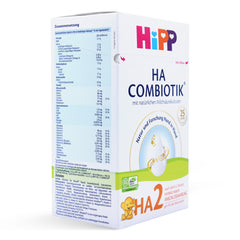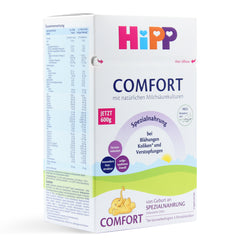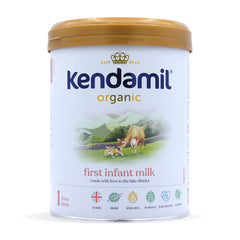Finding the Best Formula for Reflux & Spit Up in 2025
Is your clothing covered in baby spit up again, and is your little one crying from discomfort? Reflux makes every feeding a real challenge for parents. The best formula for spit up becomes an obsession for exhausted parents.
Doctors throw up their hands and advise to "wait, it will pass on its own." Easy to say when it's not your child suffering from colic after every meal. Sleepless nights, nerves on edge, and your baby is still suffering.
Desperate parents who have tried dozens of brands are looking for the best formula for reflux. Each new can is a hope for peaceful nights and a well-fed baby. But disappointment follows disappointment. Fortunately, there are special formulas that can make life much easier for families with a baby who has reflux. In this article, we will explore this topic!
Medical Disclaimer: This article is for informational purposes only and should not replace professional medical advice. Always consult your pediatrician before making changes to your baby's feeding routine or choosing specialized formulas.
Why Reflux and spit up Happen in Babies
Today, spitting up or reflux is a common problem in babies. Often, these symptoms are accompanied by the wrong formula. Reflux and spitting up are common symptoms in the first few months, but usually occurs due to the formation of the digestive system. An immature system may have underdeveloped muscles. The baby's stomach is just developing, and it feels uncomfortable. A good formula for spit up is the best choice for parents to combat this problem. Another symptom of reflux can be overfeeding. Eating too quickly or overfeeding can cause spitting up. Parents should not worry, but it is essential to look at the baby's reaction.
Also, you need to know that silent reflux can occur with less obvious symptoms than regular reflux. Usually, it causes concern due to coughing or discomfort. The baby starts crying and misbehaving after feeding. In some cases, the baby may be allergic to cow's milk protein. In this case, parents should look for hypoallergenic formulas.
A good formula for reflux can be specially thickened and made for the baby's digestion. Usually, the formula has hydrolyzed proteins to ease the digestive system. The need for a special formula is important for babies, especially in the first months of life. Treatment of regurgitation is possible for parents who care about the health of the baby.
What Makes a Formula "Good" for Reflux and Spit Up?

The best formula to reduce spit up helps to overcome different symptoms. In the market of various formulas, parents will be able to find good quality and organic composition. Today, many reputable brands offer European quality formulas for parents to review. For example, Organic Life Start provides formulas designed for sensitive babies with sensitive digestion from natural ingredients. Each formula contains the necessary vitamins and minerals that are suitable for babies. It is important for parents to know what makes a formula ideal for unusual and unpleasant symptoms. Here is key information about the characteristics of formulas:
-
Thicker consistency. Formulas may be slightly thickened with special rice starch or gum. Usually, these ingredients help the baby's stomach to digest properly. Thicker consistency helps to reduce regurgitation and reflux.
-
Hydrolyzed proteins. The best anti-reflux formula contains special hydrolyzed proteins. Proteins can relieve stomach irritation and reduce allergic reactions. Usually, hydrolyzed or partially hydrolyzed proteins are used for babies with allergic reactions. A good example is the hypoallergenic HiPP HA Stage 2 Formula for babies from 6 to 12 months.
-
Added rice starch. Rice starch is added for density for better digestion. A formula with rice or corn starch helps to be better processed by the stomach and creates a special density.
-
Probiotic formulas. A good formula for reflux contains the necessary probiotics and prebiotics. Usually, these elements support intestinal health for babies in the first months of life. A pediatrician helps to familiarize yourself with the composition of the formula and choose the best one.
Best Organic Formula for Reflux & Gas
Parents can pay attention to the best organic formulas that are designed for babies with sensitive digestion. Formulas contain organic ingredients for gas and spit up. The characteristics of the formulas will help you find out their main components and benefits. Here is key information about the quality and best formula for gas and spit up from different brands:
-
HiPP Comfort. Formulas are designed with comfort for sensitive babies. Formulas contain the necessary ingredients to combat colic and symptoms of regurgitation. Formulas can be partially hydrolyzed and have a low lactose content. Formulas usually contain the probiotics needed for the health of the baby's intestines and stomach.
-
Holle Goat Milk. Goat milk formulas are the best alternative for sensitive babies. They are usually used for babies sensitive to cow's milk. Formulas have special ingredients to reduce regurgitation and gas, and do not contain any artificial additives.
-
Kendamil Organic. One of the best organic formulas for reflux is designed accordingly using milk fats. The formula reduces irritation and is the best for sensitive babies. Organic products are used for sensitive digestion. The formula contains the necessary milk fat for good bowel function.
Top Picks: Best Formulas for Babies Who Spit Up

It can help to familiarize yourself with different formulas. Today, there are many formulas for babies on the market. For babies with sensitive digestion and regurgitation, they contain the necessary ingredients. The evaluation of each formula is extremely important for the health of the child. Parents should choose the best formula for babies that spit up for the peace of the child and their own peace of mind. Here are some key formulas and their characteristics:
-
HiPP AR. The formula of the HiPP brand is the best option for babies with sensitive digestion. The special anti-reflux formula is a European and high-quality option. The formula uses organic substances for natural thickening. A formula to help with spit up is popular with responsible parents. The formula contains essential prebiotics and omega-3 beneficial fats for the development of the child. Formulas are the best option for children from birth.
-
Aptamil AR. High-quality formula contains the necessary elements and vitamins to reduce spitting up. The formula does not contain GMOs and is best for children from birth. The formula meets nutritional recommendations and quality standards. The formula contains rice starch and vitamin E for the development and health of the baby.
Best Formula for Silent Reflux in 2025
The best formula for silent reflux is the best option for children with sensitive digestion. It is important for parents to monitor their baby's health and digestion. Silent reflux is a common problem today, which may have subtle symptoms that are harder to detect. Silent reflux can be concerning for parents due to digestive issues that aren't immediately obvious.
Reflux can have symptoms of frequent swallowing and discomfort over time. Silent reflux is uncomfortable for a small child, they can not eat well, and are constantly anxious. Silent reflux can also be accompanied by crying, poor weight gain, and coughing. It is essential to consult a doctor for proper diagnosis and advice. Today, there are a large number of different formulas for babies to reduce symptoms.
It is important for parents to know "what formula helps with reflux" and help minimize symptoms. High-quality formulas with hydrolyzed casein protein improve sensitive digestion. Formulas that have probiotics and prebiotics are useful for fussy babies. Formulas with a minimized lactose content are best for babies with allergic reactions and are suitable for babies with colic, regurgitation, and reflux.
Comfort formulas are best because they reduce acidity. The fat and whole milk base helps with digestion. It is essential to consult a pediatrician before using any specialized formulas. A pediatrician will help examine your baby and choose the best formula for sensitivity.
Tips for Formula Feeding a Baby With Reflux
It is important for parents to know "what formula helps with spit up" for comfortable digestion. Some tips will help improve digestion and reduce symptoms. A child can outgrow reflux by following proper feeding guidelines. Here are some suggestions:
-
Upright position. After feeding, it is essential to keep the baby upright for about half an hour. This position helps the formula to digest well and be better absorbed.
-
Feeding in smaller and more frequent portions. Smaller portions will help the baby digest formula better. More frequent portions will improve digestion and will be comfortable for the baby.
-
Control burping. Using the best baby formula for spit up will help minimize symptoms. Parents should encourage burping and monitor the baby's condition. The baby should burp during and after feeding for comfortable digestion.
-
Proper feeding equipment. The choice of bottles and nipples plays a key role in reducing air intake. Anti-colic bottles that reduce air intake can significantly help with reflux symptoms.
Please consult your pediatrician before implementing these feeding strategies to ensure safety and effectiveness.
Organic Life Start is committed to providing accurate, reliable, and trustworthy information to parents and caregivers. We carefully choose credible sources and follow a meticulous fact-checking process to uphold the highest standards in infant nutrition and parenting advice. To learn more about our dedication to accuracy, please explore our editorial guidelines.
Link To Sources











Hunter Coles -
We realized over time that managing our baby’s reflux wasn’t just about choosing the right formula (Thanks to HiPP HA though!). At first, we kept switching brands, hoping one would be the perfect fix. But even with good formulas, the reflux never fully went away. It finally made sense when we discovered that our feeding habits were part of the problem. We learned that pace, position, and burping techniques matter just as much as the formula itself. Once we adjusted how we were feeding her, we noticed a big difference in her comfort. She spit up less, settled faster, and seemed so much happier after each feeding. It was a humbling moment, but it taught us that small changes can make a huge impact. In the end, the combination of the right formula and better feeding practices made everything fall into place.
Forrest W -
November 24, 2025
I tried something similar when my baby struggled with reflux, but our experience was completely different because we also had to manage fast let-down during combo-feeding. A thicker formula helped a bit, but pacing feeds ended up being the real game-changer for us.
Cynthia -
November 20, 2025
I tried so many ways to address my baby’s reflux. It has been an expensive and stressful journey. During that time, my baby was not gaining weight and was lethargic the whole day, despite us spending so much on milk, bottles, nipples, and thickeners. I’m so happy I found Hipp AR when I did, because we were just at our wits’ end then.